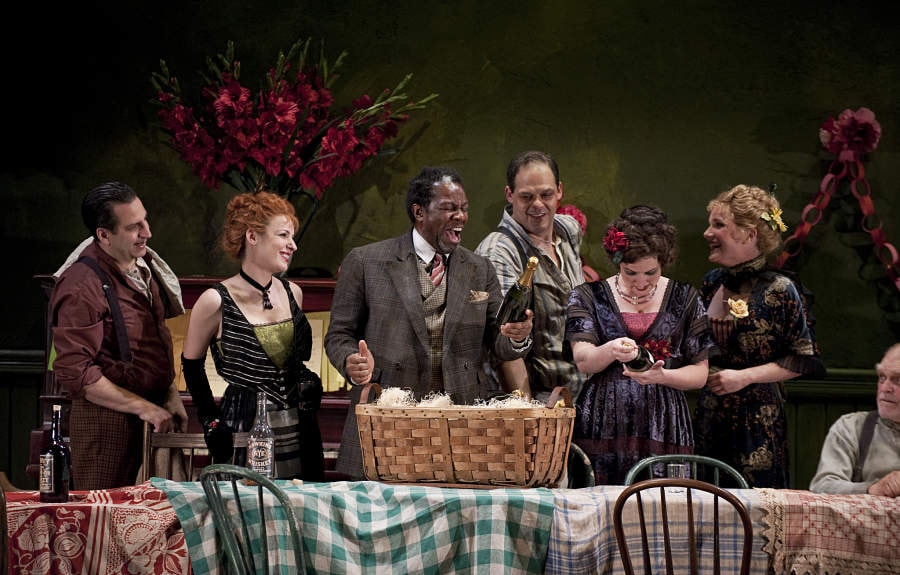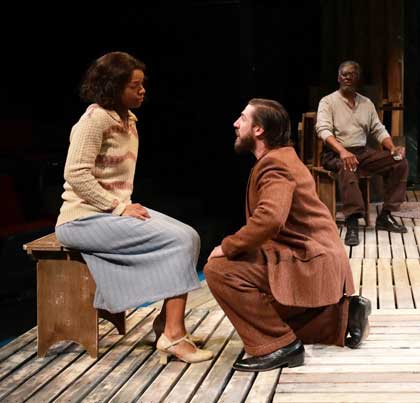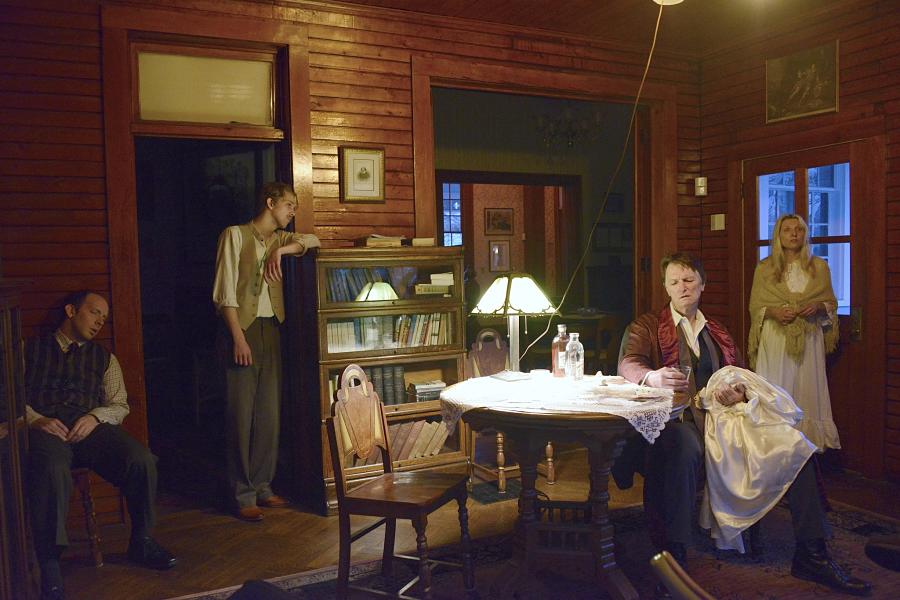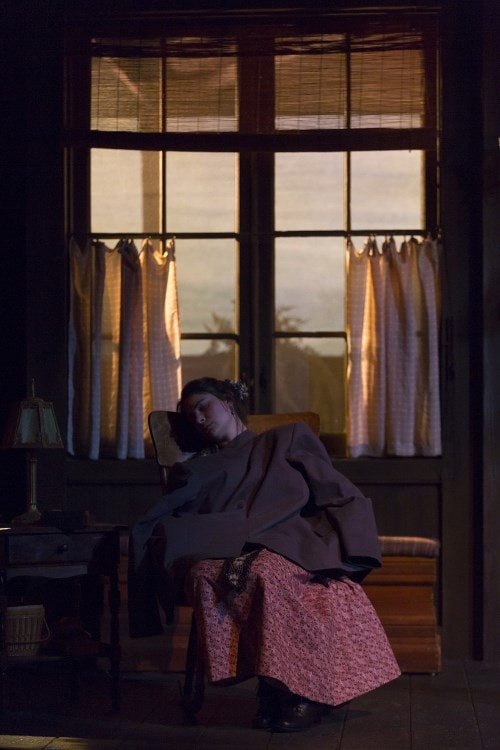“She’s my hero, no matter what her compromises were,” remarked Charlotte Moore, co-founder with Ciarán O’Reilly of New York’s Irish Repertory Theatre, of Mary Tyrone, the morphine-addicted matriarch of Eugene O’Neill’s Long Day’s Journey into Night.
Moore, O’Reilly, and actor John Douglas Thompson were participating in a session of the 11th International Conference on Eugene O’Neill, held July 6-9 at Suffolk University in Boston. Moderator Sheila Garvey, professor emerita of theatre at Southern Connecticut State University, had asked the panel if they considered the playwright a misogynist.
“He did not condescend—he gave us powerful women,” O’Reilly responded. Added Moore: “And, boy, are they hard to do, because they are complicated in every way.”
Up-to-the-minute concerns were rife in discussions of the playwright’s work over the four days, convened by the nonprofit Eugene O’Neill Society, “an international society devoted to America’s greatest playwright.” The conference, postponed due to the pandemic, was last held in 2017 in Galway, Ireland, and this year drew around 60 scholars, authors, and theatre professionals. Along with the theme of “Longing and Belonging,” this year’s conference considered parallels between the 1920s and 2020s, both decades of social turmoil, and several presenters tackled questions of O’Neill’s relevance to a more diverse and inclusive contemporary theatre, with reference to historic, recent, and forthcoming productions.
And so O’Neill’s treatment of Black characters was addressed, at the aforementioned session and in others. Thompson spoke about playing Brutus Jones in The Emperor Jones in 2009 at Irish Rep, and Joe Mott, the sole Black character in The Iceman Cometh, three years later at Chicago’s Goodman Theatre and the Brooklyn Academy of Music. Courted by O’Reilly to play the role of Jones, Thompson reasoned, “Knowing that it was the first Black protagonist in American theatre, I decided I could make a meal of it.” The original Jones, Charles Gilpin, fell out with O’Neill over the N-word, which Gilpin wanted to omit, and over other divergences he made from the script. (Paul Robeson later played Jones onstage and in the 1933 film.) Gilpin was quoted: “That Irishman, he just wrote the play.”

“I think Gilpin was wrong” to say that, Thompson said, attributing it to the actor’s ego and his heavy drinking. Thompson, who had Gilpin’s picture “on my dressing room table,” also recounted a backstage visit by a “regal-looking” Harry Belafonte, who told him: “I always thought this play was an indictment of the Black man. I don’t think that anymore.”
As for Joe Mott, Thompson—whose Iceman director was Robert Falls and whose co-stars were Nathan Lane and Brian Dennehy—explained: “I just sensed that [O’Neill] cared about this character.” On the other hand, he admitted, Mott “didn’t need to be in that play to make it a masterpiece.”
Thompson—as well as Irish Rep, the Eugene O’Neill Foundation, Thierry Dubost of the University of Caen Normandy, independent scholar Zander Brietzke, and the late Kurt Eisen of Tennessee Tech University—were awarded Eugene O’Neill Society Medallions at the conference. The medallion “recognizes distinguished individuals or organizations who have dedicated significant portions of their careers and/or work to furthering knowledge and appreciation of Eugene O’Neill.”

Among the other highlights of the Boston conference, co-chaired by Steven Bloom, professor emeritus, English, at Lasell University, and Beth Wynstra, associate professor of English at Babson College, was “Reimagining O’Neill,” a session moderated by Wynstra and held at Boston University’s Boston Playwrights’ Theater, at which Scott Edmiston, dean of theatre at Boston Conservatory at Berklee, spoke about his 2018 staging of Anna Christie at Boston’s Lyric Stage Company. He cast the show with Black actors, Lindsey McWhorter and the late Johnny Lee Davenport, as Anna and her father, and found that apart from dropping the Swedish dialect, few changes were needed. Edmiston noted that there were “a lot of young women who did not like the production,” due to the dynamic between Anna and the infatuated Mat Burke, who is disgusted to learn of Anna’s former sex work. In Act Four, Mat agrees to marry her (“God forgive me, no matter what you are”), but—as Wynstra pointed out in a presentation on “Performers and Good Wives”—this is not necessarily a happy ending.
Also on Wynstra’s panel was Eric Fraisher Hayes, artistic director of the Eugene O’Neill Foundation, which is based at Tao House in Danville, Calif., where Eugene and Carlotta O’Neill’s lived when he wrote his late masterpieces. Having made the organization the leading O’Neill presenter, Hayes declared that the pandemic has made him “a devotee of hybrid programming.” Among other projects, he produced Ghosts of Tao House, a series of short films featuring O’Neill characters. Hayes also referenced his recent, hybrid production of the rarely performed Welded, which will travel to Ireland in October.

Playwright Ronán Noone, an Irish immigrant, provided insight into the “bridge” between the Irish experience and the Irish American experience that O’Neill’s work represents. Noone attributed O’Neill’s famous suffering in writing the autobiographical Long Day’s Journey into Night, which he didn’t want published until 25 years after his death, to “the Irish in him,” saying that the late playwright’s thinking was clearly, “Don’t let anybody into the family.”
Noone’s play, The Second Girl, presented at Boston’s Huntington Theatre in 2015, depicts two servant girls and a chauffeur at a summer home in New London, Conn.—essentially the offstage action of Long Day’s Journey Into Night, a play which another panelist, Derron Wood, executive artistic director at New London’s Flock Theatre, staged in the actual summer home, Monte Cristo Cottage, where O’Neill set the play, in 2018 and 2019. (The cottage has long been owned by the Eugene O’Neill Theater Center in neighboring Waterford, Conn.) Though O’Neill had not been in the house for about 25 years, Wood marveled that his stage directions exactly captured the way the light rays fell in the cottage. Several conference attendees had seen the production, and one remarked how the actors continually reminded the audience “that she [Mary Tyrone] was upstairs.” In October, Flock will premiere a centennial production of The Hairy Ape as part of New London’s O’Neill birthday celebration.

Stage directions were also discussed in a paper by Bess Rowen, assistant professor of theatre at Villanova University, who cited the final non-dialogic words of The Hairy Ape: “And, perhaps, the Hairy Ape at last belongs.” Rowen, author of the recent book The Lines Between the Lines, explored “how these silent pieces of writing,” which she called “affective stage directions,” help to establish the mood, tone, genre, and arc of O’Neill’s plays.
Another presenter in that session—chaired by conference session planner Herman Farrell, research professor at the University of Kentucky—was Anne Fletcher, professor emeritus at Southern Illinois University, Carbondale, who focused on O’Neill as the scenic designer of his plays. Fletcher showed dozens of O’Neill’s sketches, ground plans, and elevations, noting that his involvement was the result of “dismay and disappointment” with the designs of others. Calling her analysis preliminary, she traced how he advanced from “wall-hugging furniture” and “lack of angles” to a more sophisticated focus on problem-solving. O’Neill sought credit for his concepts, which, she said, designer Robert Edmund Jones gave “a theatrical heightening.” Austerity was key; Fletcher quoted Carlotta O’Neill, who wrote in her diary, somewhat surprisingly, given her interior design preferences: “We have overdressed our stage and ourselves in our years of plenty.”
O’Neill’s popularity in China was the subject of two presentations: “Eugene O’Neill’s Plays on the Horizon of Chinese Theatre and China” by Shiyan (Helen) Xu, professor at Nanjing Normal University’s School of Foreign Languages and translator of Robert Dowling’s 2014 biography Eugene O’Neill: A Life in Four Acts; and “Staging O’Neill’s Plays in Wartime China” by Shuying Chen, a Ph.D. candidate in comparative literature at the University of South Carolina.
Among the plays given readings at the conference was Free Laughter by Susan Glaspell, a short allegorical work sparked by a 1919 Red Scare and the then-pending Pilgrim Tercentenary. With her husband, George Cram (Jig) Cook, Glaspell co-founded the Provincetown Players, where O’Neill got his start. A “Glaspell Roundtable” followed, in a collaboration between the International Susan Glaspell Society and the Eugene O’Neill Society that neatly mirrored the collaboration of Glaspell and O’Neill themselves in their early Provincetown and Greenwich Village years.
Richard Selden (he/him) is a culture writer based in New London, Conn.


